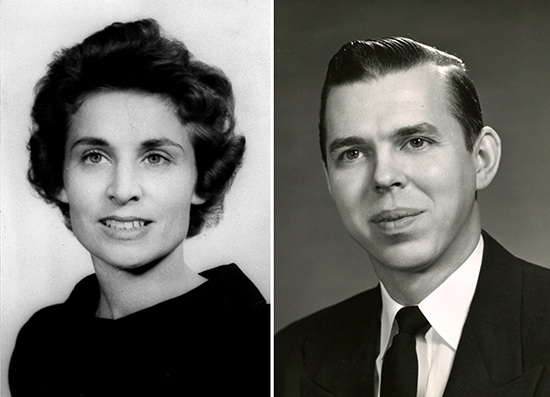
April-May 2021
Bloom
------------------
|





In Memoriam: Charles and Laura Thigpen
The True, The Good, and the Beautiful
By Phillip Morgan and Matt Pinson
During the last week of December, Free Will Baptists and Welch College lost two influential,
legacy-building leaders, Charles Allen and Laura Jane Thigpen, both 94 years of age. Mrs. Thigpen died December 28, followed by Dr. Thigpen three days later. Both died of complications from COVID-19.
Few couples have influenced the development of the Free Will Baptist Church in the 20 and 21st centuries as much as Charles and Laura Thigpen. Over four decades of service at Welch College, they shaped the ethos of higher education and leadership development at the denominational higher education institution, and through it, the character of a movement.
A Call to Service
In 1948, L. C. Johnson, founding president of Welch and consummate developer of leaders, learned of a promising young Southern Methodist couple serving in Tuscaloosa, Alabama. Thigpen was pastoring a Southern Methodist church there. Johnson telegraphed the couple, gauging their interest in teaching at then Free Will Baptist Bible College.
The couple had graduated from Bob Jones College only the year before, Charles with a degree in English and Bible, “Lolly” with a degree in speech and drama. The Thigpens married the summer after graduation, a union that lasted 73 years. They took Dr. Johnson up on his offer, and both began teaching at the College in 1948. Thigpen also served in administrative roles as dean of men and registrar during those early years.
God had prepared Charles and Laura Thigpen for just this sort of calling, the merging of academics and ministry. Both had been reared in rural South Carolina, Charles in Olanta and Lolly in Turbeville, or, more precisely, Puddin’ Swamp. They grew up in the Southern Methodist church but came to accept Free Will Baptist doctrine and spent 72 years serving Free Will Baptists.
Charles and Laura encapsulated what it meant to be a southern gentlemen and lady, mannerly and well-spoken yet down-to-earth and charming. These qualities, along with an uncommonly strong work ethic, were honed in college, and the intellectual curiosity of their youth deepened their interest in the church and its impact on the larger culture, especially through preaching, the written and spoken ministry of the Word, the arts, and culture.
Biblical Education for the Whole of Life
These emphases, which dovetailed with those of L. C. and Ruth Johnson, fashioned a unique combination of biblical and liberal arts education in an era when there was great pressure in the denomination simply to have a Bible institute to provide basic Bible training, with little or no grounding in the classical liberal arts.
The Thigpens saw no dichotomy between practical ministry training and an emphasis on evangelism steeped in the study of Scripture and doctrine on the one hand, and reading the great books and learning about classical music and history and Shakespeare on the other. They believed Christian leaders, whether clergy or laity, should be steeped in the wisdom of the Christian tradition.
Thigpen’s heart for preaching and pastoral ministry, which he taught throughout his career, were on full display in a fruitful, four-year ministry at Highland Park (MI) FWB Church from 1953 to 1957, before the Thigpens returned to Nashville to resume their academic calling.
Thigpen served as the college dean (which encompassed both dean of students and academic dean roles in those days) from 1957 to 1967 and as academic dean from 1967 to 1979. In these roles, he marshalled his considerable administrative skills to network with other colleges and universities to transfer the College’s credits.
Thigpen also fostered the concern for college accreditation, leading FWBBC to accreditation by the Accrediting Association of Bible Colleges (now the Association for Biblical Higher Education), an organization over which he would eventually serve as president. During these years, he also earned a master’s degree from Winona Lake School of Theology (1953) as well as a master’s in psychology (1970) and doctorate in English literature (1975) from Middle Tennessee State University.
Dr. Thigpen was elected president of the College in 1979, following Dr. Johnson’s retirement. During his presidency he strategically led the College. He stabilized and strengthened it through a difficult time, moving it forward in its unique mission that blended the best of the Bible college and Christian liberal arts college traditions. After retiring from the presidency, he served a year as the College’s chancellor, then went on to serve 15 years as promotional secretary for the Tennessee State Association of Free Will Baptists.
That he would finish his career as a state promotional secretary speaks to his ongoing role as a servant to the Free Will Baptist Church, whose traditions of faith and practice he defended for over seven decades. Always active in the life of the National Association, he served as moderator from 1954 to 1960 (the youngest man ever to serve in that role). He also wrote thousands of pages of Bible commentary for Free Will Baptist adult Sunday School teachers through Randall House’s Bible Teacher books.
A Legacy of Excellence
The Thigpens were instrumental in cementing one of Welch College’s touchstones early on: excellence. Their dedication to excellence influenced the lives and ministries of countless graduates of the College who went out as pastors of local churches, missionaries around the world, teachers, businesspeople, and professionals in a host of other fields.
When they arrived at the College, they taught a wide range of courses. Thigpen began teaching church history and Christian education. Mrs. Thigpen headed up the speech and English courses that dovetailed with Ruth Johnson’s work to cultivate in students a concern for beauty and excellence.
Soon after arriving in Nashville, Thigpen realized the College needed to transition from a two to four-year institution. Johnson and the Board of Trustees embraced the idea, and the College conferred its first four-year degrees in May 1951.
Dr. Thigpen desired the College to display excellence in every way, including administration. For most of his tenure at FWBBC, Thigpen oversaw the academic and social lives of students as well as curricular development and faculty hiring. Under his administration, the college expanded curricular offerings and mentored and hired several of its most prominent professors.
Early influential faculty members such as Leroy Forlines, Robert Picirilli, Ralph Hampton, and Mary Ruth Wisehart were taught and mentored by the Thigpens. During his tenure, he also hired missionary luminaries Laura Belle Barnard and LaVerne Miley to teach and train missionaries, and distinguished educator William Henry Oliver to lead the fledgling teacher education program.
Charles Thigpen was an innovative leader who always looked for ways to expand the curriculum. He worked tirelessly to develop a teacher education program, ensuring the state of Tennessee would accept graduates in the public school system. However, Thigpen always insisted that expanding curriculum did not mean the College was abandoning its founding purpose. He was committed to keeping the Bible and theology as the integration point for the entire curriculum, and service to the church at its center.
Mrs. Thigpen’s influence on the College also was instrumental for its development. She was a demanding professor who expected the best from her students. Her courses were designed to stretch students and introduce them to new ideas. She emphasized aesthetic and academic excellence in every course she taught. In the process, she cultivated an appreciation for the true, the good, and the beautiful. Beyond teaching speech and literature, Mrs. Thigpen shared her passion for drama with the college family.
For Mrs. Thigpen, theatrical productions were more than evangelism and edification but also works of art to the glory of God. Initially, students performed plays under a tent beside Davidson Hall because the college had no auditorium. Mrs. Thigpen creatively worked around these difficulties to provide excellent productions. Later, she developed monthly vespers services for the community, held on Sunday afternoons. These programs incorporated music, speech, and drama to teach biblical subjects.
Out of this work, Mrs. Thigpen developed the Evangel Players. She intended for the group to perform dramas that could be adapted for the local church in hopes it would influence churches to perform their own dramas with excellence. Her efforts displayed the purpose of the College before audiences across the denomination.
The Thigpen Presidency
When Johnson retired in 1979, the Board of Trustees tapped Thigpen to serve as the third president. Over the next decade, he led the College through some of its most challenging days. Despite the challenges, Dr. Thigpen moved the institution forward significantly. During his first year, the College initiated its first master’s program for ministers, offering courses in biblical studies, historical theology, church administration, counseling, and apologetics. The next year, 1981–82, marked the highest enrollment in the institution’s history with 648 students.
Three years later, Thigpen led the expansion of undergraduate curriculum again, creating missions and physical education majors. The College also formed its first intercollegiate athletic team: the Flames (men’s basketball). Memorial Auditorium and Davidson Hall underwent massive renovations, and the first computers were purchased for student use. Thigpen managed all of this despite the challenges the College faced.
Exemplary Models
Charles and Lolly Thigpen were exemplary models of Christian marriage and family life. They had four children, Laura (Cannon), Ann (Maines), Ruth (Slaten), and Jonathan, who passed away in 2001. Their children carried on their parents’ strong commitment to Christ, service to the church, and leadership. The Lord blessed the Thigpens with 14 grandchildren and 22 great-grandchildren.
Their daughters Ruth and Ann recently summed up their spiritual legacy to their family with these words:
“They lived a life of integrity and were authentic Christ followers in our home in a way that drew us to desire to become like Jesus. In their personal lives, they were soul-winners, always concerned about those around them, meeting their spiritual and physical needs. In our home and family, they were exactly who others thought they were. Their godly legacy has impacted our lives and continues to influence the lives of our children and grandchildren. Our prayer is that this blessing extends throughout future generations.”
Welch College and the National Association of Free Will Baptists will be forever grateful to God for the ministry and leadership of Charles Allen and Laura Jane Thigpen, who influenced thousands of people for the gospel of the Kingdom over their 73 years together. Thanks be to God for their legacy of building a faithful institution committed to truly Christian teaching and learning, rooted in their lives of humble service to their Lord.
About the Writer: Dr. Matt Pinson is president of Welch College. Phillip Morgan chairs the Welch College History department. Together, they authored Light and Truth, the 75 year history of Welch College. Learn more about Welch College: welch.edu.
|
|

